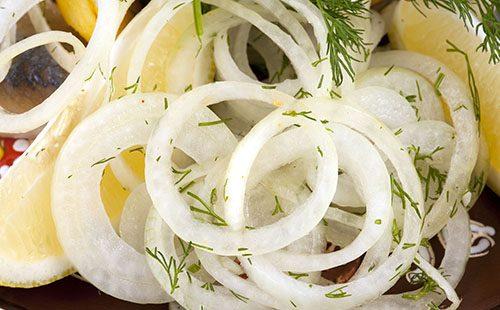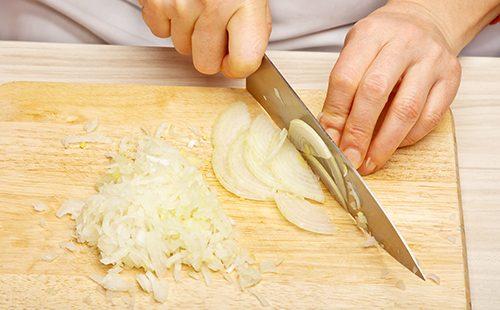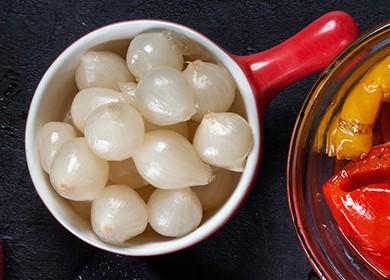Despite its bitterness and pungent aroma, onion is the most common vegetable in the world. Here are just some interesting facts about this product.
- Historical roots. The exact place and time of origin of onions is unknown to historians, but they found that the vegetable was known in ancient Egypt. In the writings of Herodotus it is indicated that the slaves who built the Cheops pyramid were fed onions to increase their working capacity and prevent disease.
- Palm. Libya is considered the world leader in onion consumption. Almost all national dishes add this vegetable.
- Sweeter than fruit. The vegetable surpasses apples and pears in sugar content. That is why during cooking it becomes sweet.
- Earth prototype. The ancient Sumerians considered onions a product of the gods. They were sure that the Earth was created exactly on the model of this vegetable.
- Many species. Currently, there are about 900 types of onions in the world, but a little more than 200 are edible. The rest are wild-growing varieties that are not of nutritional value.
The benefits of the main ingredient
Onion is not just a food product or flavoring. This is a real home doctor. Doctors say eating half the onion daily (in the absence of contraindications), you can protect yourself from malaise, diseases of the internal organs and colds. The secret lies in the rich chemical composition, which is described in the table.
Table - The chemical composition of onions
| Substance | Amount, mg / 100 g | The share of the daily norm,% | Biological role |
|---|---|---|---|
| Vitamin B6 | 0,12 | 6 | - Promotes the absorption of fatty acids and the normal course of biological reactions; - prevents sudden surges in glucose in the blood; - normalizes the brain and improves memory; - increases mental and physical performance; - heals the heart and blood vessels; - eliminates puffiness |
| Vitamin C | 10 | 11 | - Stimulates the production of your own collagen; - takes part in the synthesis of steroid hormones; - cleanses the body of toxins and heavy metals; - supports liver health; - strengthens the immune system; - normalizes blood coagulation; - strengthens the walls of blood vessels and makes them elastic |
| Potassium | 175 | 7 | - Normalizes blood pressure; - prevents the formation of cholesterol plaques in the vessels; - prevents the formation of kidney stones; - promotes the conversion of glucose into energy; - normalizes the work of the heart; - facilitates the delivery of oxygen to the brain |
| Sulfur | 65 | 7 | - Supports the production of bile at an optimal level; - slows down the aging process of the body; - activates collagen synthesis; - accelerates metabolism; - stabilizes the nervous system; - strengthens the immune system; - has antihistamine properties |
| Phosphorus | 58 | 7 | - Strengthens bone tissue; - increases mental and physical performance; - contributes to the production of enzymes involved in biological processes; - normalizes protein and carbohydrate metabolism; - maintains acid-base balance |
| Iron | 0,8 | 5 | - Provides cellular and tissue respiration; - accelerates metabolism; - provides healthy body growth; - stimulates the conduct of nerve impulses; - normalizes the thyroid gland; - strengthens the immune system |
| Cobalt | 0,005 | 50 | - Improves blood composition; - takes part in the production of red blood cells; - normalizes the intestinal microflora; - promotes cell renewal; - supports the normal functioning of the endocrine system; - strengthens bones; - reduces the level of "bad" cholesterol; - slows down the aging process of the body |
| Manganese | 0,23 | 12 | - Supports the normal functioning of the nervous system; - contributes to the production of insulin; - accelerates metabolism; - prevents fatty degeneration of the liver; - stimulates reproductive function; - accelerates tissue regeneration |
| Copper | 0,09 | 9 | - It has redox activity; - promotes the absorption of iron; - promotes tissue and cellular respiration; - strengthens bones; - strengthens the walls of blood vessels and makes them elastic; - suppresses inflammatory processes; - improves blood composition |
| Chromium | 0,002 | 5 | - Regulates lipid metabolism; - normalizes the thyroid gland; - strengthens the heart muscle; - accelerates cell regeneration; - removes toxins from the body |
| Zinc | 0,85 | 7 | - Included in more than 300 enzymes; - accelerates cell regeneration; - takes part in protein metabolism; - stimulates reproductive function; - normalizes the work of the sebaceous glands; - strengthens the immune system; - cleanses the body of toxins; - exacerbates the sensitivity of taste and olfactory receptors |
Pickled onions for the winter: recipes for every taste
Onions are usually pickled cold. But for winter preparations use the hot method. It is more laborious, but the result fully justifies the effort. The vegetable will give its bitterness to the marinade, and it will be saturated with the expressive taste of spices and vinegar.
Traditional
Features. The traditional recipe for pickling onions is passed down from generation to generation. Simple technology and a simple set of ingredients yield a wonderful savory appetizer with a sweet and sour flavor. If you pickle the small onions correctly, it will turn out transparent, but it will retain a delicious crunch.
You will need:
- 1 kg of sowing onions;
- 0.5 l of water;
- 30 g of salt;
- 40 g of sugar;
- 70 ml of vinegar (9%);
- hot pepper pod;
- ten peas of black pepper;
- two dill umbrellas;
- Bay leaf.
Cooking
- Fill a large pot (3-5 l) with water, boil, place peeled onions in it and boil for three minutes. It should only soften slightly, and not cook completely.
- Prepare a container with cold (and preferably ice) water in advance. Using a slotted spoon, move the still hot bow into it. This technique helps the product stay crispy.
- Pour vinegar into 0.5 liters of water, sprinkle all flavorings and chopped pepper. Boil and continue cooking for another two minutes.
- In clean half-liter jars, place the onions tightly and pour on hot marinade.
- Sterilize for five minutes (no longer, otherwise the onion will boil) and roll up.
With beetroot
Features. If you want something traditional and at the same time unusual, try to cook pickled onions for the winter without sterilization with beets. Burgundy vegetable will give the main ingredient not only a pleasant sweetness, but also a rich pink color. Thus, from eating snacks you will receive not only gastronomic, but also aesthetic pleasure.
You will need:
- 400 g of small red onions;
- 50 g of beets;
- 0.4 l of water;
- 30 g of salt;
- 50 g of sugar;
- seven peas of black pepper;
- 30 ml of vinegar.
Cooking
- Peel the onion, and cut the beets with oblong bars about 6 mm thick.
- Add bulk products and pepper to the water, boil.
- Add the beets and cook for a couple of minutes.
- Place the onions in the marinade and cook for five minutes.
- Transfer the onions into a 0.75 liter sterile jar and lay the beets on top.
- Pour in the vinegar as well as the marinade to fill all the voids in the container.
- It remains to roll up the jar.
Spicy
Features. Pickled onions in jars for the winter is an indispensable preparation. It will decorate any casual or festive dish. And it goes well with hot spices and spices.
You will need:
- 2 kg of onions;
- 2 l of water;
- 0.7 l of vinegar;
- 300 g of salt;
- 1 g of star anise;
- three bay leaves;
- 1 g of cinnamon;
- 1 g of red ground pepper;
- three peas of allspice;
- two inflorescences of cloves.
Cooking
- Dissolve 200 g of salt in a liter of water and dip peeled onions in brine.
- Meanwhile, add the remaining salt and spices to a liter of water.
- Boil the liquid and boil for five minutes. Add vinegar.
- Transfer the onions into sterilized jars, fill with hot marinade and clog.
With bell pepper
Features. Pickled onions with garlic and pepper for the winter - this is the perfect combination for fragrant preparations. Being saturated with each other's aromas, vegetables acquire completely new taste shades. The appearance of the workpiece also can not but rejoice. The amount of ingredients is designed for two cans of 0.5 l.
You will need:
- 1 kg of small onions;
- 200 g of bell pepper;
- 12 cloves of garlic;
- eight peas of black pepper;
- two bay leaves;
- 2 g of citric acid;
- a bunch of dill;
- 2 l of water;
- 20 g of salt;
- 80 g of sugar;
- 250 ml of vinegar.
Cooking
- Heat a liter of water, dissolve citric acid in a liquid and soak the peeled onions. Boil for three minutes and remove the vegetables from the water.
- Free the pepper from the seeds and cut into rings.
- In sterilized jars, put six cloves of garlic, four peas of pepper and on a bay leaf.
- Lay layers of onion and pepper alternately on top.
- Fill the remaining space of the jar with washed and scalded dill.
- Dissolve bulk products in a liter of water and boil.
- Add vinegar, pour the liquid into jars and roll up.

Rings
Features. Lovers of kebabs, burgers, salads and just savory snacks are recommended to cook pickled onion rings for the winter. This semi-finished product is especially aromatic and tasty, because thin fragments are thoroughly saturated with marinade.
You will need:
- 400 g of onion;
- 200 ml of water;
- 2 g cloves;
- 5 g of black pepper peas;
- 5 g allspice peas;
- 15 g of sugar;
- 10 g of salt;
- 30 ml of vinegar;
- two bay leaves.
Cooking
- Cut the peeled onions into rings.
- Put all flavors in the water and boil.
- Add onions and simmer for five minutes.
- Arrange the product in sterile jars, fill with marinade and roll up.
With original marinade
Features. If simple recipes for pickled onions for the winter do not inspire you, try to make something original in a traditional appetizer. The peculiarity of this recipe is an unusual citrus marinade.
You will need:
- 1 kg of small onions;
- 600 ml of vinegar;
- 250 ml of water;
- 250 ml of orange juice;
- 50 g of salt;
- 15 g tarragon;
- 10 g of cloves;
- 5 g of cinnamon;
- 100 g of raisins;
- 100 g of sugar.
Cooking
- Pour the peeled onions with salt and leave for five hours.
- Combine water with orange juice, raisins and spices.
- Boil, add onions and boil for a couple of minutes.
- Using a slotted spoon, spread the onions over the sterilized jars.
- Add vinegar to the marinade, boil and distribute the liquid into the containers with the workpiece.
Green sprouts
Features. As a reminder of the warm season, you can pickle green onions for the winter. The workpiece is beautiful and fragrant. The taste of onion feathers is rather unusual and bright. This is a great addition to salads.
You will need:
- 1 kg of green onions;
- 200 g of dill;
- 80 ml of vinegar;
- 120 g of salt;
- 60 g of sugar;
- 1 liter of water;
- three peas of black pepper.
Cooking
- Wash and sort the greens, cut off the dry and yellowed fragments.
- Put flavorings in water and boil.
- Turn off the hotplate and add vinegar to the marinade.
- Arrange greens in sterile jars, tapping lightly.
- Pour marinade and roll.

Work with a vegetable without tears
Onion contains a lacrimator. This substance, falling into the air from a cut bulb, irritates the mucous membrane of the eyes and makes you cry. To make working with a vegetable easier for you, try the five tricks of the housewives.
- Cold water. The liquid neutralizes the effect of the lacrimator. Therefore, before working with onions, as well as in the process, it is recommended to rinse the bulb itself and the knife in cold water. Some housewives even manage to clean the vegetable in a large basin filled with liquid.
- Freezing. If you have to work with large volumes of onions, put it in the freezer for an hour. Onion juice crystallizes and will not evaporate into the air. If the amount of work is small, you can freeze the knife for 15 minutes.
- Steam. Place a pot of water on the stove and boil. Sit close to the steam source. It neutralizes the effect of the lacrimator.
- Ventilation. Turn on the hood while working with the bow. The device will draw in onion fumes, and they will not have time to irritate your eyes. If you do not have a hood, put a fan near the workstation. In the warmer months, you can work with an open window.
- Vinegar or lemon. Treat the chopping board with acid. Onion juice will react with vinegar, and the effect of the lacrimator will be neutralized.
If you care about family health, the recipe for pickled onions for the winter must be present in your cookbook. The fact is that in the process of harvesting the vegetable does not lose its beneficial properties. Thus, this fragrant “antibiotic” will protect your household from colds all winter.

